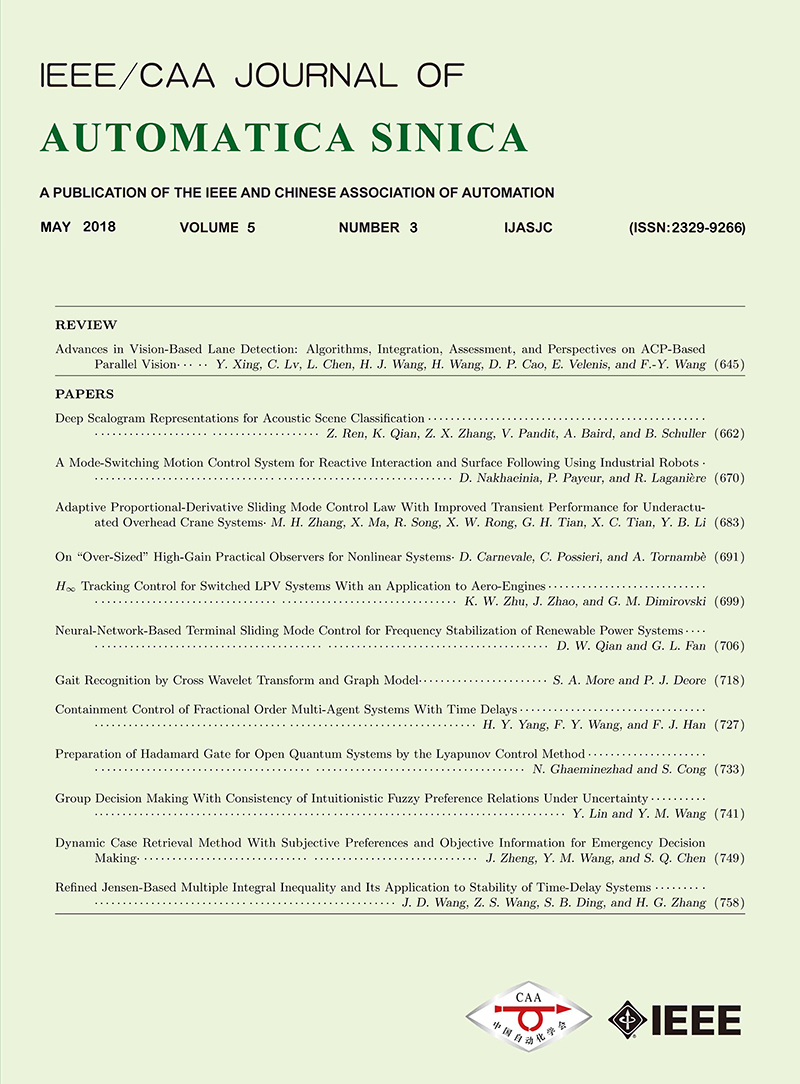 Volume 1
Issue 1
Volume 1
Issue 1
IEEE/CAA Journal of Automatica Sinica
| Citation: | Airong Wei, Xiaoming Hu and Yuzhen Wang, "Tracking Control of Leader-follower Multi-agent Systems Subject to Actuator Saturation," IEEE/CAA J. of Autom. Sinica, vol. 1, no. 1, pp. 84-91, 2014. |

| [1] |
Hu T S, Lin Z L. Control Systems with Actuator Saturation:Analysis and Design. Boston:Birkhäuser, 2001
|
| [2] |
Lin Z L, Saberi A. Semi-global exponential stabilization of linear systems subject to "input saturation" via linear feedbacks. Systems and Control Letters, 1993, 21(3):225-239
|
| [3] |
Chen B M, Lee T H, Peng K M, Venkataramanan V. Composite nonlinear feedback control for linear systems with input saturation:theory and an application. IEEE Transactions on Automatic Control, 2003, 48(3):427-439
|
| [4] |
da Silva J M G, Tarbouriech S. Local stabilization of discrete-time linear systems with saturating controls:an LMI-based approach. IEEE Transactions on Automatic Control, 2001, 46(1):119-125
|
| [5] |
Wei A R, Wang Y Z. Stabilization and H∞ control of nonlinear portcontrolled hamiltonian systems subject to actuator saturation. Automatica, 2010, 46(12):2008-2013
|
| [6] |
Cao Y Y, Lin Z L, Ward D G. Anti-windup design of output tracking systems subject to actuator saturation and constant disturbances. Automatica, 2004, 40(7):1221-1228
|
| [7] |
Zhou B, Duan G G, Lin Z L. A parametric Lyapunov equation approach to the design of low gain feedback. IEEE Transactions on Automatic Control, 2008, 53(6):1548-1554
|
| [8] |
Sabrei A, Hou P, Stoorvogel A A. On simultaneous global external and global internal stabilization of critically unstable linear systems with saturating actuators. IEEE Transactions on Automatic Control, 2000, 45(6):1042-1052
|
| [9] |
Lin Z L. Low Gain Feedback. London:Springer-Verlag, 1998.
|
| [10] |
Teel A R. Semi-global stabilizability of linear null controllable systems with input nonlinearities. IEEE Transactions on Automatic Control, 1995, 40(1):96-100
|
| [11] |
Lin Z L. H∞-almost disturbance decoupling with internal stability for linear systems subject to input saturation. IEEE Transactions on Automatic Control, 1997, 42(7):992-995
|
| [12] |
Olfati-Saber R, Fax J A, Murray R M. Consensus and cooperation in networked multi-agent systems. Proceedings of the IEEE, 2007, 95(1):215-233
|
| [13] |
Ren W, Beard R, Atkins E. A survey of consensus problems in multiagent coordination. In:Proceedings of the 2005 American Control Conference. Portland, OR, USA:IEEE, 2005. 1859-1864
|
| [14] |
Fax J A, Murray R M. Information flow and cooperative control of vehicle formations. IEEE Transactions on Automatic Control, 2004, 49(9):1465-1476
|
| [15] |
Hong Y G, Hu J P, Gao L X. Tracking control for multi-agent consensus with an active leader and variable topology. Automatica, 2006, 42(7):1177-1182
|
| [16] |
Li X, Wang X F, Chen G R. Pinning a complex dynamical network to its equilibrium. IEEE Transactions on Circuits and Systems-I:Regular Papers, 2004, 51(10):2074-2087
|
| [17] |
Ren W, Moore K L, Chen Y Q. High-order and model reference consensus algorithms in cooperative control of multi-vehicle systems. Journal of Dynamic Systems, Measurement, and Control, 2007, 129(5):678-688
|
| [18] |
Jadbabaie A, Lin J, Morse A S. Coordination of groups of mobile autonomous agents using nearest neighbor rules. IEEE Transactions on Automatic Control, 2003, 48(6):988-1001
|
| [19] |
Gustavi T, Dimarogonas D, Egerstedt M, Hu X M. Sufficient conditions for connectivity maintenance and rendezvous in leader-follower networks. Automatica, 2010, 46(1):133-139
|
| [20] |
Hong Y G, Chen G R, Bushnell L. Distributed observers design for leader-following control of multi-agent networks. Automatica, 2008, 44(3):846-850
|
| [21] |
Nedic A, Ozdaglar A, Parrilo P A. Constrained consensus and optimization in multi-agent networks. IEEE Transactions on Automatic Control, 2010, 55(4):922-938
|
| [22] |
Cortés J. Finite-time convergent gradient flows with applications to network consensus. Automatica, 2006, 42(11):1993-2000
|
| [23] |
Yang T, Stoorvogel A A, Grip H F, Saberi A. Semi-global regulation of output synchronization for heterogeneous networks of non-introspective, invertible agents subject to actuator saturation. International Journal of Robust and Nonlinear Control, doi: 10.1002/rnc.2905
|
| [24] |
Meng Z Y, Zhao Z Y, Lin Z L. On global leader-following consensus of identical linear dynamic systems subject to actuator saturation. Systems and Control Letters, 2013, 62(2):132-142
|
| [25] |
Li Z K, Duan Z S, Chen G R, Huang L. Consensus of multiagent systems and synchronization of complex networks:a unified viewpoint. IEEE Transactions on Circuits and Systems-I:Regular Papers, 2010, 57(1):213-224
|